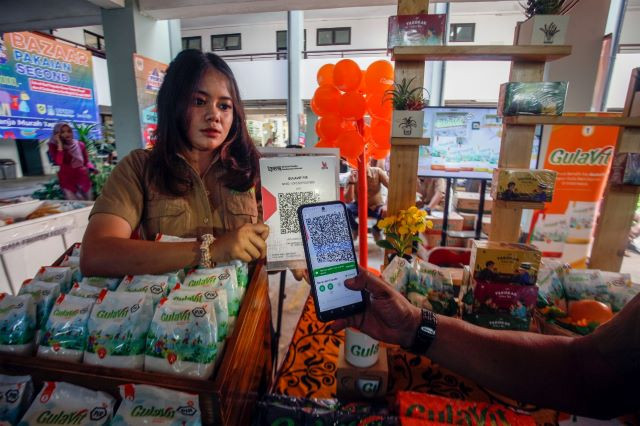Popular Reads
Top Results
Can't find what you're looking for?
View all search resultsPopular Reads
Top Results
Can't find what you're looking for?
View all search resultsConnecting nations, connecting payments in ASEAN
The ASEAN spirit, emphasizing unity as "ASEAN one community, one destiny" must be reinforced to ensure the proper realization of collaboration within payment systems.
Change text size
Gift Premium Articles
to Anyone
T
echnological advancements have revolutionized various facets of human life, fundamentally altering the landscape of transactions and payment mechanisms. In this era of digitalization, a seamless and interconnected payment system assumes a pivotal role in expediting trade and nurturing economic expansion, especially throughout ASEAN.
Embracing 10 diverse member nations, each characterized by distinct technological and regulatory nuances, ASEAN stands at the threshold of a momentous opportunity, poised to amplify collaboration and drive economic prosperity within the region through advancing payment-system connectivity.
With a population of nearly 670 million people, Southeast Asia boasts considerable potential. Notably, there has been rapid growth in internet penetration. Internet users across six Southeast Asian countries witnessed an increase of 40 million users (10 percent) in 2021, with an anticipated additional rise of 20 million users (5 percent) in 2022.
The substantial number of internet users contributes to a significant market share for the digital economy, projected to reach US$194 billion in 2022. This figure is projected to further escalate to $330 billion by 2025.
While cash payments remain predominant in ASEAN, accounting for 60 percent in 2019, predictions from the Institute for Development of Economics and Finance (INDEF) indicate a decline to 49 percent for cash transactions. Forecasts with the highest growth potential, standing at 24 and 6 percent respectively by 2025, pertain to digital cards and wallets.
The shift from cash dependency toward digital payments is poised to accelerate; thus, supporting and harnessing this potential is crucial for regional progress.
At the core of driving payment connectivity lies the imperative to address the hurdles posed by technological and regulatory disparities across individual countries. Distinct infrastructures and payment systems, both in terms of technology and regulations, are found across these nations.
This heterogeneity introduces complexities to the task of integrating and forging connections for cross-border transactions. To realize seamless and efficient payment system connectivity across the ASEAN landscape, harmonizing regulations among the member nations emerges as a critical endeavor.
To surmount the challenges surrounding payment-system connectivity within ASEAN, member countries must unite and collaborate as a community. The ASEAN spirit, emphasizing unity as "ASEAN one community, one destiny" must be reinforced to ensure the proper realization of collaboration within payment systems.
Member countries should share knowledge, experiences and resources to enhance technological infrastructure and regulatory standards within payment systems. The commitment to establishing an integrated payment ecosystem in ASEAN requires close cooperation and coordination.
Bank Indonesia (BI), as the vanguard of Indonesia's financial landscape, emerges as an active proponent in driving payment system connectivity across ASEAN. Leveraging the framework of bilateral and multilateral forums, BI collaborates with central banks and stakeholders in ASEAN to fortify cross-border payment system connectivity.
A notable milestone includes the March workshop on Integrating Cross-Border Payment Systems, a joint effort facilitated by the Bank of England and ASEAN central banks. This workshop served as a conduit for fostering synergy and bolstered interconnectedness within the ASEAN realm.
Another significant initiative launched since 2018 is BI’s diligent execution of the local currency settlement (LCS) cooperation framework with several nations, including Malaysia and Thailand. This pioneering initiative, currently evolving into a local currency transaction (LCT), streamlines cross-border transactions among member nations while reducing dependence on the US dollar.
Over five years, BI has engaged in LCT cooperation with the central banks of five countries: China, Malaysia, Thailand, Japan and South Korea. Within ASEAN, Indonesia spearheads regional payment connectivity (RPC) and LCT. Out of the 10 ASEAN member countries, five have already signed this memorandum of understanding: Indonesia, the Philippines, Thailand, Singapore and Malaysia.
Another of Indonesia's major initiatives, namely, the Quick Response Indonesia Standard (QRIS) code and Fast Payment Bank Indonesia (BI FAST), exemplify this paradigm. Furthermore, in addition to the five ASEAN nations mentioned earlier, Vietnam, Brunei Darussalam, Laos and Cambodia are expected to embrace connectivity as the momentum toward integration gains further traction.
The forthcoming years, marked by the 2023 ASEAN chair, are poised to catalyze collective endeavors among the remaining five ASEAN member countries. The undertaking will aim to transition away from reliance on the US dollar while fostering the augmentation of their payment systems' connectivity.
Rooted in the unified spirit of ASEAN as an interwoven community and fortified by robust collaboration among its member nations, the realization of payment connectivity within the region becomes unequivocal.
Bank Indonesia, in its role as Indonesia's central bank, occupies a pivotal niche in propelling payment system connectivity through international cooperation, trilateral and multilateral dialogues. With an unwavering commitment to collaboration, the attainment of payment system connectivity within ASEAN assumes a tangible horizon.
This integration, seamlessly aligned with the tenets of the digital era, stands poised to galvanize ASEAN as a cohesive regional entity – characterized by shared community values and an unwavering collective spirit.
***
The writer is a junior economist at Bank Indonesia. The views expressed are her own.










